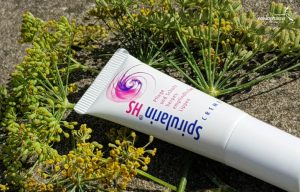For many years, we at ocean pharma have been working on the topic of oral herpes (type 1, “herpes labialis”) and researching effective microalgae active ingredients.
Herpes labialis is known to be caused by the herpes simplex virus. The first infection with the virus usually goes unnoticed and often occurs before the age of six. If the immune system is weakened, a (renewed) infection can occur. What should be done then?
Together with experts, we would like to provide tips and advice on how to deal with cold sores. Especially around small children.
For adults, cold sores initially appear harmless
Everyone affected knows that blisters on the lips are not pretty and often cause suffering. However, they can often be controlled with the right antiviral and antibacterial treatment. Of course, those affected want a quick and uncomplicated way of treating them, but it’s not quite that simple.
Even if the infection is often only slightly visible or even almost gone when it subsides, no false conclusions should be drawn. This is because remaining sores from herpes blisters are often still colonized with bacteria and viruses.
This must not be forgotten! If they are not rendered harmless, herpes viruses can still be transmitted even when they have subsided. Whether through direct contact, for example via a kiss, but also through simple fleeting contact. This is a very important factor to consider. After all, how quickly do you touch your mouth or lips without thinking or give someone a kiss on the mouth or cheek as a farewell or greeting?
This is very often the case with a baby or small child. Just this small touch can be enough to transmit bacteria and viruses. This therefore always happens when fluid escapes from the blisters and there is contact.
What exactly are herpes viruses?
Herpes viruses are responsible for many different infections of the skin and mucous membranes in humans. The herpes simplex virus type 1 and type 2, for example, are responsible for lip herpes, herpes in the mouth, herpes in the nose or herpes in the genital and anal area (genital herpes) (source: herpesviren.com).
These viruses settle in nerve nodes and, if the immune system is weakened, can migrate, infect cells and (re)trigger a disease. Almost everyone comes into contact with the herpes virus in the course of their lives, and 90 percent of the population actually carry this virus. Not everyone develops herpes. However, the virus remains in the body and can therefore repeatedly become the cause of an infection.
Anyone can get cold sores if they have a weakened immune system. Stimuli such as psychological stress or illness are possible triggers. Strong sunlight or disgust can also be a cause. This also disrupts the body’s immune defense. Herpes simplex viruses can be reactivated and migrate back to the “site” of infection. The result is a herpes simplex infection.
Herpes – risk of infection for babies
This is precisely why it is so important to develop an appropriate level of sensitivity. Especially when dealing with small children or babies, because transmission occurs from person to person. According to experienced specialists, herpes can only be transmitted if there are visible symptoms.
However, although this may sound harmless at first, these tiny viruses are life-threatening, especially for small babies or newborns, as they do not yet have a mature immune system. The herpes viruses can spread unhindered to organs or the brain. In severe cases, they can even cause irreparable damage.
It is therefore important to be particularly careful here. This means that people with the first symptoms or an already visible herpes infection should not go near newborns or small children. This issue should also not be neglected during pregnancy. Women who are prone to cold sores can suffer particularly frequently from the unpleasant blisters during pregnancy. This is because their immune system is often slightly weakened.
If these pathogens enter the genital area, the baby can become infected during birth. This means that parents in particular should use virus-inhibiting products directly and take appropriate hygiene measures. Of course, this also applies to contact with other people in order to avoid transmission in general.
If you liked the article or have any questions, please feel free to contact our experts at info@ocean-pharma.de.
Image source: Denira / stock.adobe.com




